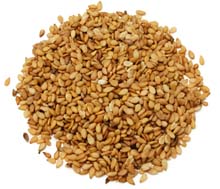Health Benefits of Sesame Seeds

While sesame seeds have been grown in tropical regions throughout the world since prehistoric times, traditional myths hold that their origins go back even further. According to Assyrian legend, when the gods met to create the world, they drank wine made from sesame seeds.
Not only are sesame seeds a very good source of copper and manganese, but, according to the website WHFoods.com, they are also a good source of calcium, magnesium, iron, phosphorus, thiamin (vitamin B1), zinc and dietary fiber. Just a quarter-cup of sesame seeds supplies 74.0% of the daily value (DV) for copper, known for its use in reducing some of the pain and swelling of rheumatoid arthritis. Copper's effectiveness is due to the fact that this trace mineral is important in a number of anti-inflammatory and antioxidant enzyme systems. A quarter-cup of sesame seeds also supplies 31.6% of the DV for magnesium.
Sesame seeds are an excellent source of calcium for those avoiding cow’s milk. However, the phosphorus content is much higher, as is true of most seeds, thus making it not quite as good for bone support.
In addition, sesame seeds contain two unique substances: sesamin and sesamolin. Both of these substances belong to a group of special beneficial fibers called lignans, and have been shown to have a cholesterol-lowering effect in humans, and to prevent high blood pressure and increase vitamin E supplies in animals. Sesamin has also been found to protect the liver from oxidative damage.
One hundred grams sesame seeds contain 26.4g protein; sesame seeds are especially rich in methionine and tryptophan, two essential amino acids often lacking in adequate quantities in many plant proteins.
Sesame seeds can be eaten raw, dried, roasted or cooked with all kinds of foods.
|